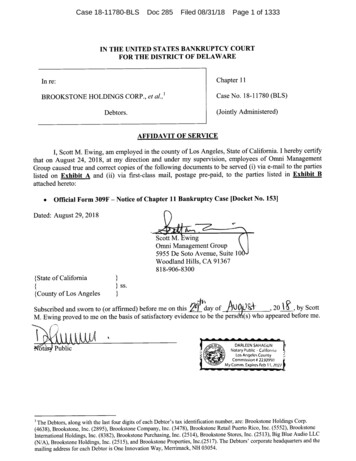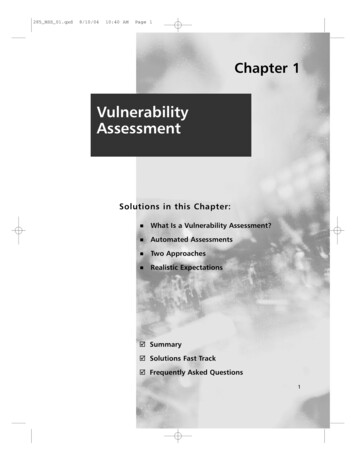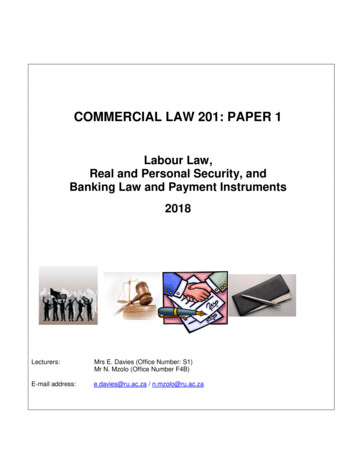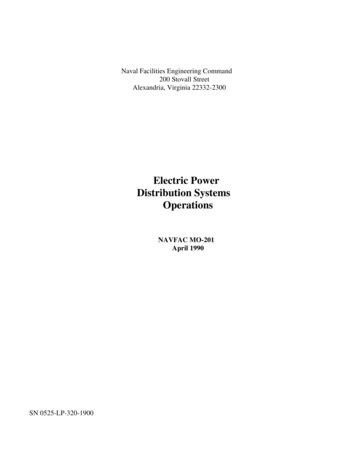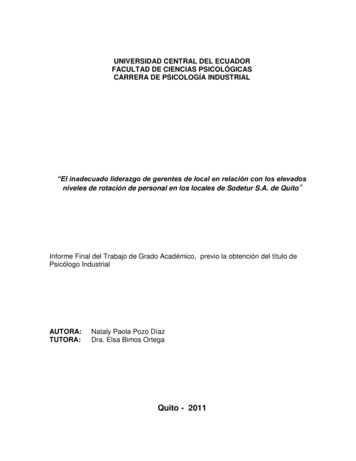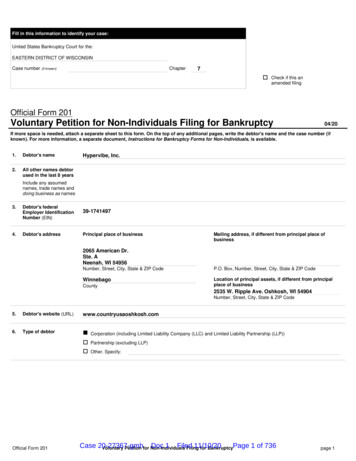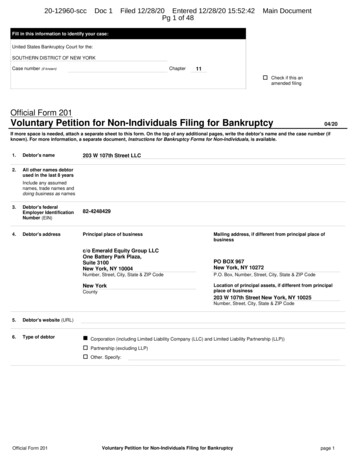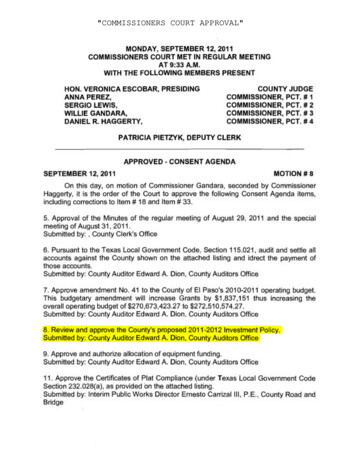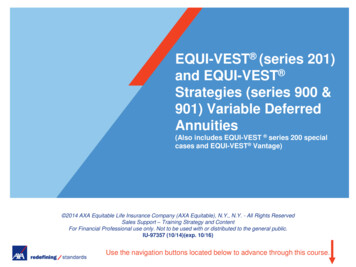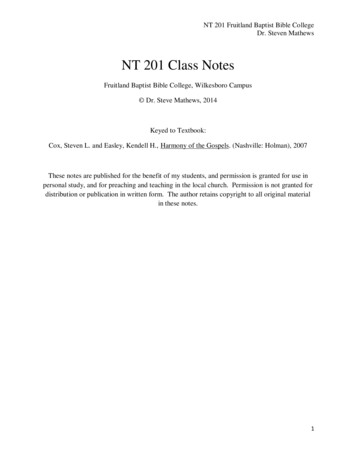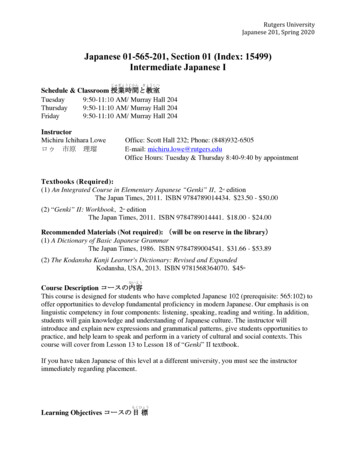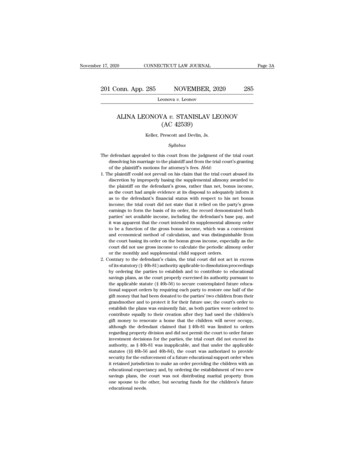
Transcription
November 17, 2020CONNECTICUT LAW JOURNAL201 Conn. App. 285NOVEMBER, 2020Page 3A285Leonova v. LeonovALINA LEONOVA v. STANISLAV LEONOV(AC 42539)Keller, Prescott and Devlin, Js.SyllabusThe defendant appealed to this court from the judgment of the trial courtdissolving his marriage to the plaintiff and from the trial court’s grantingof the plaintiff’s motions for attorney’s fees. Held:1. The plaintiff could not prevail on his claim that the trial court abused itsdiscretion by improperly basing the supplemental alimony awarded tothe plaintiff on the defendant’s gross, rather than net, bonus income,as the court had ample evidence at its disposal to adequately inform itas to the defendant’s financial status with respect to his net bonusincome; the trial court did not state that it relied on the party’s grossearnings to form the basis of its order, the record demonstrated bothparties’ net available income, including the defendant’s base pay, andit was apparent that the court intended its supplemental alimony orderto be a function of the gross bonus income, which was a convenientand economical method of calculation, and was distinguishable fromthe court basing its order on the bonus gross income, especially as thecourt did not use gross income to calculate the periodic alimony orderor the monthly and supplemental child support orders.2. Contrary to the defendant’s claim, the trial court did not act in excessof its statutory (§ 46b-81) authority applicable to dissolution proceedingsby ordering the parties to establish and to contribute to educationalsavings plans, as the court properly exercised its authority pursuant tothe applicable statute (§ 46b-56) to secure contemplated future educational support orders by requiring each party to restore one half of thegift money that had been donated to the parties’ two children from theirgrandmother and to protect it for their future use; the court’s order toestablish the plans was eminently fair, as both parties were ordered tocontribute equally to their creation after they had used the children’sgift money to renovate a home that the children will never occupy,although the defendant claimed that § 46b-81 was limited to ordersregarding property division and did not permit the court to order futureinvestment decisions for the parties, the trial court did not exceed itsauthority, as § 46b-81 was inapplicable, and that under the applicablestatutes (§§ 46b-56 and 46b-84), the court was authorized to providesecurity for the enforcement of a future educational support order whenit retained jurisdiction to make an order providing the children with aneducational expectancy and, by ordering the establishment of two newsavings plans, the court was not distributing marital property fromone spouse to the other, but securing funds for the children’s futureeducational needs.
Page 4ACONNECTICUT LAW JOURNAL286NOVEMBER, 2020November 17, 2020201 Conn. App. 285Leonova v. Leonov3. The trial court erred in finding the defendant in contempt for violatingthe automatic orders in effect, pursuant to the relevant rule of practice(§ 25-5), by renting a seasonal ski lodge, as it was undisputed that theplaintiff failed to file a written motion for contempt regarding the rentalof the ski lodge: the defendant had no notice that he was facing acontempt finding with respect to the rental of the ski lodge, as theplaintiff’s motion for contempt alleged only that the defendant violatedthe automatic orders in purchasing cryptocurrency; furthermore, thetrial court did not abuse its discretion in ordering the defendant toreimburse the plaintiff for one half of the cost the defendant incurredin renting the ski lodge and to reimburse the plaintiff for one half ofthe loss that he incurred as a result of a cryptocurrency investmenthe made after the imposition of the automatic orders, as the recordsufficiently demonstrated that, contrary to the defendant’s claims, therental of the ski lodge and the investment in the cryptocurrency werenot made in the usual course of business as provided in the exceptionto Practice Book § 25-5 for the transfer or disposal of marital property;the defendant admitted that he did not request permission from theplaintiff prior to purchasing the cryptocurrency, that he did not haveaccounts to make that type of investment prior to the commencementof the dissolution action, he did not discuss the rental of the seasonalski lodge with the plaintiff, and, although the parties took vacationstogether during their marriage, the plaintiff did not ski, the parties neverrented a ski lodge during their marriage, and the defendant shared theseasonal ski lodge with others; moreover, even in the absence of acontempt finding, a trial court has the authority to compensate a spousefor losses caused by a violation of the automatic orders by adjustingthe distribution of marital assets in the injured spouse’s favor.4. The trial court did not abuse its discretion by failing to attribute an earningcapacity to the plaintiff in determining alimony and child support, therecord having sufficiently supported the court’s determination to baseits awards of child support and alimony on the plaintiff’s actual incomeat the time of the dissolution, which it found to be zero, as such determination was not contrary to law; the court expressly stated that it hadconsidered all of the relevant statutes before rendering its judgment,and the trial court has broad discretion in varying the weight placed oneach statutory criterion under the circumstances of each case.5. The trial court did not err in awarding the plaintiff attorney’s fees forrepresentation during the marital dissolution proceedings, postjudgmentmatters, and this appeal, as the trial court properly exercised its broaddiscretion in granting the plaintiff’s motions for attorney’s fees; thiscourt, in affording the trial court every reasonable presumption in favorof the correctness of its decision, found that the trial court could haverelied on evidence relevant to each statutory (§ 46b-82) criterion as itapplied to both parties, and that not awarding the plaintiff attorney’sfees would have had the effect of undermining its other financial orders.Argued June 15—officially released November 17, 2020
November 17, 2020CONNECTICUT LAW JOURNAL201 Conn. App. 285NOVEMBER, 2020Page 5A287Leonova v. LeonovProcedural HistoryAction for the dissolution of marriage, and for otherrelief, brought to the Superior Court in the judicial district of Stamford and tried to the court, Hon. Michael E.Shay, judge trial referee; judgment dissolving the marriage and granting certain other relief, from which thedefendant appealed to this court; thereafter, the court,Hartley Moore, J., granted the plaintiff’s motions forattorney’s fees and granted certain other relief, and thedefendant filed an amended appeal. Reversed in part;further proceedings.Campbell D. Barrett, with whom were Johanna S.Katz, and, on the brief, Jon T. Kukucka, for the appellant (defendant).Charles D. Ray, with whom, on the brief, was AngelaM. Healey, for the appellee (plaintiff).OpinionKELLER, J. The defendant, Stanislav Leonov, appealsfrom the judgment of the trial court, dissolving his marriage to the plaintiff, Alina Leonova, which included afinding of contempt against the defendant, and fromtwo postjudgment orders awarding the plaintiff attorney’s fees incurred in connection with postdissolutionproceedings and her defense of this appeal. On appeal,the defendant claims that the trial court (1) abused itsdiscretion by improperly basing supplemental alimonyawarded to the plaintiff on the defendant’s gross, ratherthan net, bonus income, (2) acted in excess of its statutory authority when it ordered the parties to establishand to contribute to education savings plans establishedpursuant to 26 U.S.C. § 529 (§ 529 plans) for the benefitof each of the two minor children, (3) acted in excessof its statutory authority when it found the defendantin contempt for an alleged violation of the automaticorders set forth in Practice Book § 25-5, despite the fact
Page 6ACONNECTICUT LAW JOURNAL288NOVEMBER, 2020November 17, 2020201 Conn. App. 285Leonova v. Leonovthat there was no contempt motion pending, (4) abusedits discretion when it found the defendant in contemptfor two violations of the automatic orders where thedefendant’s financial expenditures fell within the ‘‘usualcourse of business’’ exception to the rule, (5) abusedits discretion by failing to attribute an earning capacityto the plaintiff in determining alimony and child support,and (6) in violation of the directive of General Statutes§ 46b-62 (a) and relevant decisional law, improperlyawarded the plaintiff attorney’s fees for representationduring the marital dissolution proceedings, postjudgment matters and this appeal.1 We agree with the defendant’s third claim only. Accordingly, we reverse the judgment of dissolution only with respect to one of the contempt findings, and remand the case to the trial courtwith direction to vacate its finding that the defendantwas in contempt with respect to one of the violationsof the automatic orders alleged by the plaintiff. We affirmthe judgment and postjudgment orders of the court inall other respects.The plaintiff brought the underlying dissolution actionagainst the defendant in 2017. A contested trial took placein December, 2019, during which both parties wererepresented by counsel. The following undisputed facts,or facts as found by the trial court, and additional procedural history are relevant to this appeal. The plaintiff andthe defendant were married in New York, New Yorkon March 10, 2006. Both parties emigrated as childrenfrom regions of the former Soviet Union, the defendantfrom Ukraine and the plaintiff from Azerbaijan. Eachis a naturalized citizen and is fluent in English. Thereare two minor children issue of the marriage who, at1As will be discussed in greater detail later in this opinion, the attorney’sfees awarded for representation during the dissolution were ordered bythe Honorable Michael E. Shay, judge trial referee. The fees awarded forrepresentation during postjudgment proceedings and to defend this appealwere ordered by Judge Margarita Hartley Moore.
November 17, 2020CONNECTICUT LAW JOURNAL201 Conn. App. 285NOVEMBER, 2020Page 7A289Leonova v. Leonovthe time of the judgment of dissolution, were ages fourand three. From the time that the parties separated inMarch, 2017, until the time of the dissolution, the plaintiff resided in a condominium owned by the parties at25 West Elm Street in Greenwich (Greenwich condominium). The children resided primarily with the plaintiff.2 The defendant resided in an apartment in WhitePlains, New York.The defendant, at the time of the dissolution, wasthirty-nine years old and in good health. He has a degreein computer science and has worked steadily throughout the marriage. For the six years of marriage preceding the divorce, he had been employed by Viking GlobalInvestors in Greenwich as a team leader in quantitativedevelopment. He earned an annual base salary of 400,000and also regularly received an additional annual discretionary bonus. In 2017, he received a gross bonusof 508,500 and was expecting to receive a gross bonusof 550,000 for 2018.3The plaintiff, at the time of the dissolution, was thirtyfive years old and in general good health, but has visionproblems and a serious hearing deficit, which wouldrequire further surgery to partially restore her hearing. She had earned a master’s degree in business administration from Fordham University while working fulltime earlier in the marriage, but had not been fully2Prior to the dissolution, pursuant to a pendente lite order based on astipulation of the parties dated August 7, 2018, the defendant had accessto the children every Wednesday night and every other weekend. The courtannexed to its decision a ‘‘Regular Parenting Plan’’ or ‘‘Schedule A,’’ towhich the parties never agreed, and made this Schedule A part of its parentingorders. The court granted the defendant access to the children on alternatingweekends and Wednesday nights from 6 p.m. to Thursday morning, as wellas additional access on designated holidays, birthdays, school breaks andtwo nonconsecutive weeks during the summer. The orders pertaining tothe parties’ joint legal custody, parental access and other parenting responsibilities are not challenged on appeal.3During a hearing on the plaintiff’s postjudgment motions for attorney’sfees on April 1, 2019, the defendant testified that he recently had receivedhis 2018 bonus of 550,000.
Page 8ACONNECTICUT LAW JOURNAL290NOVEMBER, 2020November 17, 2020201 Conn. App. 285Leonova v. Leonovemployed outside of the home since 2012. She considered herself a full-time homemaker, although she sporadically earned money during the marriage. In oneinstance she performed some part-time bookkeeping,earning between 4000 and 5000, and in another instanceshe earned several hundred dollars related to her photography hobby.The principal assets of the parties included two properties in Connecticut and a cooperative apartment inBrooklyn, New York (Brooklyn co-op). The parties stipulated that one of the Connecticut properties, the jointlyowned Greenwich condominium occupied by the plaintiff, had a fair market value of 580,000. There was amortgage on that property in the amount of approximately 416,000. The parties also owned a larger homeat 215 Riverside Avenue in Greenwich (Riverside house),which they had purchased during the marriage and renovated. On each of their financial affidavits, the partiesindicated that the Riverside house had a fair marketvalue of 2.5 million with an outstanding mortgage ofapproximately 1,467,000. At trial, the defendant complained that the plaintiff spent far too much money onthe renovations.4 The plaintiff testified that if she hadknown that the family was not going to occupy theRiverside house when the renovations were complete,she never would have spent so much.5 To complete therenovations, the plaintiff had borrowed 50,000 fromher mother, and both parties acknowledged that the4The plaintiff testified that the parties paid 2.5 million for the Riversidehouse and spent 500,000 on the renovations. At the time of the dissolution,it had been listed at 2,495,000 after being on the market for more than ayear. On March 1, 2019, the defendant filed a motion to terminate theappellate stay regarding the orders for the sale of the Riverside house. Inhis motion, he alleged that the plaintiff was refusing to consider offers ofpurchase and that the mortgage on the property, which he was obligatedto pay, was 24,000 in arrears. After a hearing, the court granted the motionto allow for the listing and sale of the property with the net proceeds ofany sale to be held in escrow pending the outcome of this appeal.5Both parties testified that the plaintiff supervised the renovation projectas if she were the general contractor.
November 17, 2020CONNECTICUT LAW JOURNAL201 Conn. App. 285NOVEMBER, 2020Page 9A291Leonova v. Leonov 60,000 that the plaintiff’s mother had gifted to the parties’ children, 30,000 to each child at the time of thechild’s birth, also was spent for that purpose. The parties also jointly owned the Brooklyn co-op, which wasunder a contract for sale for 290,000. There was approximately 195,000 of equity in that property.Other marital assets included several retirementaccounts, three belonging to the defendant and onebelonging to the plaintiff. The unspent balance of thedefendant’s 2017 net bonus, approximately 63,000, wasbeing held in escrow in one of the checking accountspursuant to a court order.6The plaintiff also held an interest in an apartment andan apple orchard in Azerbaijan, which she estimatedhad a combined value of 50,200. The defendant claimedno interest in either. Both parties, as of the time of thedissolution, had accumulated a substantial amount ofcredit card debt, as well as debts to family and friends.The court, in its factual conclusions, was more critical of the defendant than of the plaintiff, noting, as follows: ‘‘During the pendency of the case, [the defendant]received an annual bonus for 2017, most of which hespent, much of it on credit card debt. As a result, thecourt entered pendente lite orders, among other things,6On December 12, 2017, the plaintiff filed a motion to enjoin, pendentelite, seeking to prevent the defendant from reducing in ‘‘any way, shape orform’’ the net bonus he had received from his employer for the calendaryear 2017.In an oral decision, the court, Colin, J., granted the motion after makingthe following finding: ‘‘The evidence showed that the defendant received asubstantial bonus. He unilaterally decided to pay off a substantial amountof debt notwithstanding any difficulties that may exist in communicationbetween the parties.‘‘The common sense, right thing to do would have been to discuss with[the plaintiff] how you were going to spend 145,000 approximately beforeyou did it. . . . The moving party has established enough probable causethat without some further relief there’s some risk that the remaining portionof the bonus will be spent without the moving party having any input orsay into it.’’
Page 10ACONNECTICUT LAW JOURNAL292NOVEMBER, 2020November 17, 2020201 Conn. App. 285Leonova v. Leonovfreezing the unspent balance as well as other orders. Moreover, since the separation, his spending has been uncharacteristically lavish for, among other things, meals andtravel. . . . The [plaintiff] told the court that the pattern throughout the marriage was to ‘save and invest,’adding that ‘this is not my husband.’ The [defendant] didnot dispute the marital saving and spending patterns.By way of contrast, in 2018 he only paid the [plaintiff] 12,500 for support for the first half of the year and nothingsince. However, since the filing of the complaint, amongother things, without consulting the [plaintiff] or seeking her permission, he made a large, and losing, investment in some alternative currencies (so-called ‘cryptocurrencies’), like Bitcoin. In January, 2018, he invested 39,000 in these currencies and later sold them for a 22,000 loss. While the [defendant] has maintained aninvestment account, it was clear from his testimony thathe had never made such an investment before. Morerecently, again without permission, he removed 10,000from [a] checking account to rent a ski lodge for theupcoming season. . . .‘‘[The defendant] testified that the parties had ‘grownapart’ and that for a year there had been ‘no emotionalor physical relationship or intimacy.’ The [defendant]struck the court as somewhat insincere, the evidencesupporting a finding that for years he has been carryingon a long time extramarital affair with a person he meton a ski trip. The [plaintiff] told the court that she wassurprised to first find out about the [defendant’s] affairwhen he posted a picture of the girlfriend on socialmedia and it was brought to her attention by a friend.[The plaintiff] believed that the marriage could besaved. Adding to [the plaintiff’s] consternation was thefact that in April, 2016, [the defendant gave the plaintiff]a gift of an expensive diamond ring, which he claimedcost 50,000. She values the ring at 25,000.’’
November 17, 2020CONNECTICUT LAW JOURNAL201 Conn. App. 285NOVEMBER, 2020Page 11A293Leonova v. LeonovIn making its findings, the court noted that it hadconsidered all relevant statutory provisions affectingits financial orders.7 It found that both parties had contributed to the breakdown of the marriage ‘‘in somefashion,’’ but that the defendant’s actions were the primary cause.With respect to its January 10, 2019 orders, whichwere incident to the judgment of dissolution and arethe subject of this appeal, the court indicated that ithad reviewed the affidavit of attorney’s fees submittedby the plaintiff’s attorney dated December 20, 2018, andtha
ALINA LEONOVAv.STANISLAV LEONOV (AC 42539) Keller, Prescott and Devlin, Js. Syllabus . (§ 25-5), by renting a seasonal ski lodge, as it was undisputed that the . reimburse the plaintiff for one
